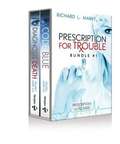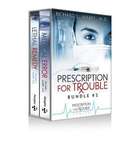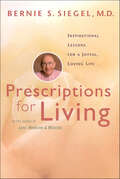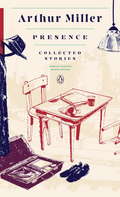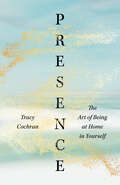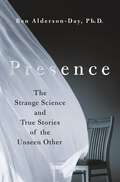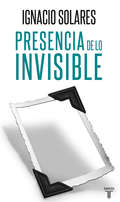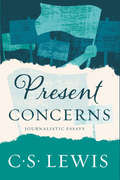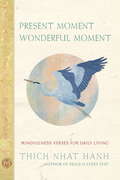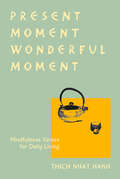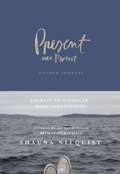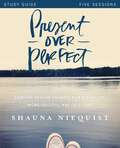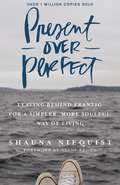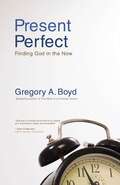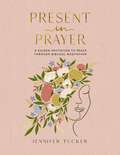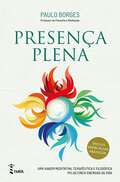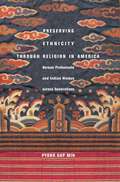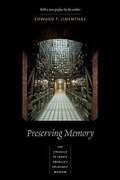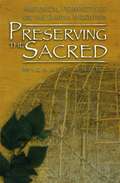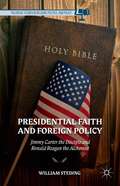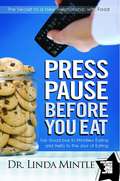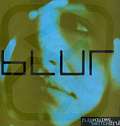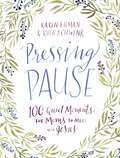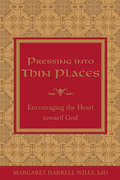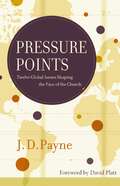- Table View
- List View
Prescription for Trouble Bundle #1, Code Blue & Diagnosis Death - eBook [ePub]
by Richard L. MabryThis bundle contains Code Blue and Diagnosis Death, PLUS bonus chapters from Medical Error and Lethal Remedy. Code Blue When Dr. Cathy Sewell returns to her hometown seeking healing after a broken relationship, she discovers that among her friends and acquaintances is someone who wants her out of town...or dead. Lawyer Will Kennedy, her high school sweetheart, offers help, but does it carry a price tag? Is hospital chief of staff Dr. Marcus Bell really on her side in her fight to get hospital privileges? Is Will's father, Pastor Matthew Kennedy, interested in advising her or just trying to get her back to the church she left years ago? When one of Cathy's prescriptions almost kills the town banker, it sets the stage for a malpractice suit that could end her time in town, if not her career. It's soon clear that this return home was a prescription for trouble. Diagnosis Death The threatening midnight calls followed Dr. Elena Gardner from one city to another, prolonging her grief. Even worse, they are echoed by the whispers of her own colleagues. Whispers that started after her comatose husband died in the ICU . . . then another mysterious death during her training. When a third happens at her new hospital, the whispers turn into a shout: "Mercy killer!" Why doesn't she defend herself? What is the dark secret that keeps Elena's lips sealed?
Prescription for Trouble Bundle #2, Medical Error & Lethal Remedy - eBook [ePub]
by Richard L. MabryThis bundle contains Medical Error and Lethal Remedy, PLUS bonus chapters from Code Blue and Diagnosis Death. Medical Error Dr. Anna McIntyre's life was going along just fine until someone else started living it. Her patient died because of an identity mix-up; her medical career is in jeopardy because of forged prescriptions; and her credit is in ruins. She thought things couldn't get worse, but that was before she opened the envelope and saw a positive HIV test with her name on it. Lethal Remedy Dr. Sara Miles' teenage patient is on the brink of death from an overwhelming, highly resistant infection. Only an experimental antibiotic, developed and administered by Sara's ex-husband can save the girl's life. But potentially lethal effects from the drug send Sara and her colleague, Dr. Rip Pearson, on a hunt for hidden critical data that will let them reverse the effects before it's too late. What is the missing puzzle piece? And who is hiding it?
Prescriptions for Living: Inspirational Lessons for a Joyful, Loving Life
by Bernie S. SiegelAs a physician who has cared for and counseled innumerable patients, Bernie S. Siegel embraces a philosophy that is at the forefront of a society grappling with medical ethics and spiritual issues. His books Love, Medicine, and Miracles (1986), Peace, Love and Healing (1989), and How to Live Between Office Visits (1993) have broken new ground in the field of healing. Over a span of twenty years, other physicians have become increasingly receptive to his message. Bernie's efforts have now turned toward humanizing medical care and medical education, and he continues to travel extensively with his wife, Bobbie, to speak at and run workshops, sharing his techniques and experiences. Bernie and Bobbie have five children and six grandchildren (so far). "This book is a continuation of the work I began when I became Bernie. It is a collection of stories about how to deal with life's difficulties. Most of the people in these stories have not had the great wake-up call; that is, they are mot facing life-threatening illnesses. So in a sense, this book is preventive medicine. It is a prescription for living that gives you effective and healthy ways of dealing with the adversity that occurs in everyone's life. I want to help you learn to accept your morality before something catastrophic brings you face-to-face with the end of your life." -- From the Introduction
Presence: Collected Stories (Deluxe Edition) (Penguin Classics)
by Arthur MillerThe collected short fiction of America's leading dramatist of the 20th century in a Penguin Classics Deluxe Edition Though best known for creating some of the greatest dramas of the twentieth century, Arthur Miller was also a master of the short story. Initially published in prestigious venues like the New Yorker, the Atlantic, and Esquire, his fiction constitutes a fascinating and indispensable portion of his life's work. Presence: Collected Stories revives and reintroduces these masterly works, making available in one volume stories previously scattered across various collections. Here, as in his best plays, Miller pulls apart the threads of American life with tender humanism and unmatched psychological realism. These stories build on the landscape of Miller's drama, of Broadway dives and Brooklyn shipyards where businessmen, writers, bums, and blue-collar workers struggle for self-worth. This vital collection celebrates not just the Miller we know through his most often-performed plays, but the whole of his astounding depth as an artist. For more than seventy years, Penguin has been the leading publisher of classic literature in the English-speaking world. With more than 1,700 titles, Penguin Classics represents a global bookshelf of the best works throughout history and across genres and disciplines. Readers trust the series to provide authoritative texts enhanced by introductions and notes by distinguished scholars and contemporary authors, as well as up-to-date translations by award-winning translators.From the Trade Paperback edition.
Presence: The Art of Being at Home in Yourself
by Tracy CochranIn 20 short, gem-like chapters, meditation teacher Tracy Cochran invites us to explore living fully in the present moment as a revolutionary practice.Tracy&’s vibrant essays from her storied life give plenty of encouragement to reframe and dive deep into our own experiences.Mindfulness offers us a way to be fully in the present moment—and as we start to embrace this practice, we learn that our lives are made of present moments. That gift of presence is the palpable experience of awareness that appears when we remember to be mindful of those moments. In 20 short chapters, Cochran encourages us to see presence as a living force—and to recognize and explore how that shows up in our lives. She offers riveting and relatable stories from her life—a spiritually transformative wine-making trip in France, a near-death experience while being mugged, managing her feisty child while on a retreat with Thich Nhat Hanh, among many others—and Buddhist teachings to encourage us to see the power of presence to illuminate and transform our past, present, and future. Cochran's observations and reminiscences are wise and pithy, and she gives us plenty of encouragement to explore and reframe our own experiences.
Presence: The Strange Science and True Stories of the Unseen Other
by Ben Alderson-DayA psychologist's journey to understand one of the most unusual experiences known to humankind: the universal, disturbing feeling that someone or something is there when we are alone.These experiences of sensing a Presence when no one else is there have been given many names—the Third Man, guardian angels, shadow figures, “social” hallucinations—and they have inspired, unsettled, and confounded in equal measure.While the contexts in which they occur are diverse, they are united by a distinct and uncanny feeling of visitation by another. But what does this feeling mean, and where does it come from? When and why do presences emerge? And how can we even begin to understand a phenomenon that can be transformative for those who experience it, and yet so hard to put into words?The answers to these questions lie in this tour-de-force through contemporary psychology, psychiatry, neuroscience, and philosophy. Presence follows Ben Alderson-Day's attempts—as a psychologist and a researcher—to understand how this experience is possible. What is a voice when it isn’t heard, and how otherwise do we know or feel that someone is in our presence? Is it a hallucination connected to psychosis, a change in the working of the brain, or something else? The journey to understand takes us to meet explorers, mediums, and robots, and step through real, imagined, and virtual worlds. Presence is the story of who we carry with us, at all times, as parts of ourselves.
Presencia de lo invisible
by Ignacio SolaresA través de dieciséis ensayos, Ignacio Solares revela capítulos desconocidos de la vida de grandes personajes de la historia. De Ignacio Solares, ganador del Premio Fernando Benítez. ¿Fue la Revolución Mexicana resultado de las lecturas espíritas de Madero? ¿Víctor Hugo tuvo conversaciones con el "otro" mundo? ¿Cuál fue la verdadera razón del ateísmo de Sartre? Presencia de lo invisible, en dieciséis ensayos, desvela episodios -muchos de ellos desconocidos- de las vidas de grandes personalidades. El giro hacia el ocultismo que dio el racionalismo irredento de Freud al final de su vida; las levitaciones de Santa Teresa, tan relacionadas con su enfermedad histérica; la creencia de Jung en los fenómenos paranormales; la hipocondría de Camus relacionada con su literatura; la relación del psicoanálisis y la religión; las dudas de Graham Greene, más que su fe misma, son algunos de los temas que el lector encontrará en este libro. Lo que ha dicho la crítica: "Ignacio Solares rescata en este ameno libro algunos de los casos más notables. A los 16 capítulos, que tienen títulos como Freud y la parasicología, Madero y los escritos espiritistas que desataron un revolución y Violencia y/o civilización, escritos con elegancia y precisión sólo les falta una cosa: más capítulos con más casos interesantes, pues el libro nos deja deseando mucho más". -Manuel Lino, El Economista.
Present Concerns: Journalistic Essays
by C. S. LewisA repackaged edition of the revered author’s essays in which he deliberates on contemporary issues, from the moral to the spiritual to the practical.C. S. Lewis—the great British writer, scholar, lay theologian, broadcaster, Christian apologist, and bestselling author of Mere Christianity, The Screwtape Letters, The Great Divorce, The Chronicles of Narnia, and many other beloved classics—was one of the foremost religious philosophers of the twentieth century; a thinker whose far-reaching influence on Christianity continues to be felt today.Demonstrating Lewis’s wide range of interests, Present Concerns includes nineteen essays that reveal his thoughts about democratic values, threats to educational and spiritual fulfillment, literary censorship, and other timely topics, offering invaluable wisdom for our own times.
Present Moment Wonderful Moment
by Thich Nhat Hanh Nicholas Kirsten-HonshinBased on Thich Nhat Hanh's best-selling book of the same title, this beautiful hand-designed box is the perfect gift for anyone who wants to create little moments of peace and joy in everyday life. The set includes a 60 page soft-cover book that provides detailed instructions and 52 cards, each with an inspiring verse for use with ordinary daily activities - "Waking Up," "Brushing Your Teeth," "Driving the Car" - as an opportunity to return to a state of mindfulness. Designed and hand painted full color illustrations on each card by award-winning artist Nicholas Kirsten-Honshin., these beautiful cards are keepsakes that can be used anytime and anywhere. Easy to access anytime from purse, pocket, or desk, these cards are ideal for anyone who wants to create small moments of peace and joy in their everyday life.
Present Moment Wonderful Moment (Revised Edition): Verses for Daily Living-Updated Third Edition
by Thich Nhat HanhBeloved Zen Master Thich Nhat Hanh offers 79 meditations to help you through your daily routines in a peaceful and mindful way and connect to the joy of the present momentWaking up this morning, I smile. Twenty-four brand new hours are before me. This beautifully illustrated book shares a simple verse with an enlightening commentary that will give you the space and heart to live each day in a connected and calm way. Developed during a summer retreat in Plum Village, Thich Nhat Hanh's meditation center in France, these poetic verses were collected to help people practice mindfulness. The result is a handbook of practical, down-to-earth verses. These gathas, or mindfulness verses, are poetic verse designed to turn ordinary daily activities such as washing the dishes, driving the car, or standing in line, into opportunities to return to a natural state of mindfulness and happiness.Reciting these poetic yet practical verses can help us to slow down and enjoy each moment of our lives.
Present Over Perfect Guided Journal: Journey to a Simpler, More Soulful Life
by Shauna NiequistAre you more burned-out than energized? Do you too often start the day tired and overwhelmed? Leave behind the heavy weight of comparison, competition, and exhaustion, and recraft a life marked by meaning, connection, and unconditional love in this interactive journal from New York Times bestselling author Shauna Niequist.In the mess and the mundane, how do you begin to find space in your life? Shauna takes you on a journey toward growth and grounding that will bring about a meaningful transformation in your marriage, your family, your friendships, and your prayer life. The Present Over Perfect Guided Journal offers:Thought-provoking quotes from Shauna to inspire youGuided writing prompts and interactive activitiesJournaling space to write your thoughtsBeautiful textured cover and two-color interiorWhether you've read Present Over Perfect or not, this guided journal will equip you to apply and live its principles either through independent introspection or small group dialog and discussion, it will be a favorite on your bedside table or at the beach, and it also makes a perfect gift for birthdays, Christmas, and Mother's Day and for anyone searching for peace in their life.Sink deep into wonder, rest, and stillness in this interactive invitation to weave the truths of Present Over Perfect into your life.Look for additional inspirational books and audio products from Shauna:I Guess I Haven't Learned That YetPresent Over PerfectBread and WineSavor
Present Over Perfect Study Guide: Leaving Behind Frantic for a Simpler, More Soulful Way of Living
by Shauna Niequist Ashley WiersmaIn this five session video Bible study (DVD/digital video sold separately), New York Times bestselling author Shauna Niequist invites you on a journey that changed her life. She will walk a path with you, a path away from frantic pushing and proving, and toward your essential self, the one you were created to be before you began proving and earning of your worth. Shauna will help you begin leaving behind busyness and frantic living and rediscovering the person you were made to be. Present Over Perfect is a hand reaching out, pulling you free from the constant pressure to perform faster, push harder, and produce more, all while maintaining an exhausting image of perfection. She offers an honest account of what led her to begin this journey, and a compelling vision for an entirely new way to live: soaked in grace, rest, silence, simplicity, prayer, and connection with the people that matter most to us. The study guide includes first thoughts, video notes, group discussion questions, practicing presence reflections, and solo work for you to complete between sessions. Sessions include: Pain Points The Roles We Play Yes, And No Unflashy, Unspectacular, Good Living the Love Designed for use with the Present Over Perfect Video Study 9780310816034 (sold separately).
Present Over Perfect: Leaving Behind Frantic for a Simpler, More Soulful Way of Living
by Shauna NiequistOVER 1 MILLION COPIES SOLD!New York Times bestselling author Shauna Niequist invites you to look at the landscape of your own life, consider how it might feel to leave behind the pressure to be perfect, and begin the practice of simply being present in the middle of the mess.A few years ago, Shauna found herself exhausted and isolated, her soul and body sick. She was tired of being tired and burned out on busy. It seemed like almost everyone she talked to was in the same boat: longing for connection, meaning, and depth, but settling for busy.But then something changed. She decided to trade the hustle and bustle for grace, love, stillness, and play, and it changed everything. Shauna offers an honest account of what led her to begin this journey and a compelling vision for an entirely new way to live: soaked in rest, silence, simplicity, prayer, and connection with the people who matter most to us.As you witness Shauna's journey, you'll be inspired to embark on one of your own. She gives you the encouragement you need to:Put an end to people-pleasing tendenciesEmbrace moments of simplicity, quiet, and stillnessAccept that you are worthy of love, belonging, and joyWritten in Shauna's warm and vulnerable style, this collection of essays focuses on the most important transformation in her life, and maybe yours too: leaving behind busyness and frantic living and rediscovering the person you were made to be. Present Over Perfect is a hand reaching out, pulling you free from the constant pressure to perform faster, push harder, and produce more while maintaining an exhausting image of perfection.Join the over one million others who have already started walking this new path away from frantic pushing and proving and toward their true selves.
Present Perfect: Finding God in the Now
by Gregory A. BoydA "Holy Habit" That Will Change Your Life!Experience true spiritual transformation: invite God's presence into your life! Popular author, theologian, and pastor Gregory Boyd shows you how--simply, practically, and effectively--in this thoughtful and accessible book. Discover:How to pray continuallyWhat it means to "take every thought captive"How to wake up to God&’s ever-present love God is closer to you than the air you breathe.He is present in every given moment. Wake up to his presence! Turn off the mental chatter that keeps you from seeing his glory. Embrace the holy habit of inviting God's presence into your life, and be transformed!We long to be transformed. Yet our minds are filled with endless trivia and self-centered chatter. To-do lists. Worries about the past. Speculation about the future. We forget to live in the present moment . . . and to invite God to be with us there.After reading classic contemplative authors Brother Lawrence, Jean-Pierre de Caussade, and Frank Laubach, theologian and pastor Gregory Boyd longed to experience the presence of God for himself. For two decades, he's attempted to implement the "practice of the presence of God" in his own life . . . sometimes succeeding, sometimes failing. What he's learned as a fellow pilgrim on his spiritual journey can help you find true spiritual transformation as you begin to practice the discipline of inviting God into every moment."I've become absolutely convinced that remaining aware of God's presence moment-by-moment is the single most important task in the life of every follower of Jesus," Boyd writes. "I'm convinced this challenge is implied in our commitment to surrender our life to Christ, for the only real life we have to surrender to him is the one we live moment-by-moment." Join Boyd on this transformational journey of a lifetime!
Present in Prayer: A Guided Invitation to Peace Through Biblical Meditation (30 Devotional Meditations on Scripture to Guide You in Prayer)
by Jennifer TuckerStill your soul and rest your mind as you cultivate a purposeful prayer life by focusing your thoughts on God&’s Word.Do you notice that even when your body is not moving, your mind is racing? Anxiety, to-do lists, and the spiral of negative thought patterns often keep us from the stillness we long for. In Present in Prayer, award-winning author Jennifer Tucker invites you to allow the Holy Spirit to speak through God's Word and renew your mind through the practice of Christian meditation.As in her first book, Breath as Prayer, Jennifer shares a powerful prayer practice in this beautifully illustrated book that is deep yet accessible. Each of the 30 meditations offers you:A gentle call to silence, an opening prayer, and a thoughtful reflection on a Bible verseGuided meditation on Scripture using the centuries-old practice of lectio divina—a framework of Christian meditation that helps you slow down and linger on God&’s WordA prayer of surrender and prompts for how to live out the truths God is speaking to youInspired art to draw you into each meditation as you consider what is lovely, true, excellent, and worthy of praise Present in Prayer is an ideal gift for:Anyone experiencing stress, anxiety, or overwhelming thoughtsThose who want to establish a more regular prayer practicePrayer groups and prayer ministries You're not in a hurry. You're on a journey. Cultivate a more purposeful and peaceful prayer life and greater intimacy with God as you focus your thoughts on His Word.
Presença Plena
by Paulo Borges«Façamos desta leitura uma viagem de peregrinação pelo território sagrado que somos, descobrindo e deixando irradiar a liberdade, consciência, amor, abundância e criatividade que já existem em nós, como os nossos mais profundos e desconhecidos recursos.» «Presença» é muito mais do que apenas estar. É um não-sei-quê que nos envolve, impossível de expressar e definir plenamente. Com isto em mente, Paulo Borges leva-nos aqui numa jornada pelos cinco aspectos fundamentais da experiência da presença: a presença aberta, a presença consciente, a presença amorosa, a presença abundante e a presença criativa. Um livro que deve ser lido e vivido de um modo diferente, prático e experiencial, com disponibilidade e entrega para com os exercícios propostos, como se se tratasse de um retiro ou workshop presencial.Porque, no final, o mais importante não é exclusivamente a compreensão intelectual, mas sim aprofundar a prática, parando sempre que necessário para realizar as experiências meditativas
Preserving Ethnicity through Religion in America: Korean Protestants and Indian Hindus across Generations
by Pyong Gap Min2012 Honorable Mention Award, Sociology of Religion Section, presented by the American Sociological Association2011 Honorable Mention for the American Sociological Association International Migration Section's Thomas and Znaniecki Best BookPreserving Ethnicity through Religion in America explores the factors that may lead to greater success in ethnic preservation. Pyong Gap Min compares Indian Americans and Korean Americans, two of the most significant ethnic groups in New York, and examines the different ways in which they preserve their ethnicity through their faith. Does someone feel more “Indian” because they practice Hinduism? Does membership in a Korean Protestant church aid in maintaining ties to Korean culture?Pushing beyond sociological research on religion and ethnicity which has tended to focus on whites or on a single immigrant group or on a single generation, Min also takes actual religious practice and theology seriously, rather than gauging religiosity based primarily on belonging to a congregation. Fascinating and provocative voices of informants from two generations combine with telephone survey data to help readers understand overall patterns of religious practices for each group under consideration. Preserving Ethnicity through Religion in America is remarkable in its scope, its theoretical significance, and its methodological sophistication.
Preserving Memory: The Struggle to Create America's Holocaust Museum
by Edward T. LinenthalSince its first year in 1993, the United States Holocaust Memorial Museum has attracted more than 15 millino visitors, sometimes at the rate of 10,000 a day, each of whom has walked away with an indelible impression of awe in the face of the unimaginable. This lively, honest, behind-the-scenes account details the emotionally complex fifteen-year struggle surrounding the museum's birth.
Preserving the Sacred: Historical Perspectives on the Ojibwa Midewiwin (Manitoba Studies in Native History #13)
by Michael AngelThe Midewiwin is the traditional religious belief system central to the world view of Ojibwa in Canada and the US. It is a highly complex and rich series of sacred teachings and narratives whose preservation enabled the Ojibwa to withstand severe challenges to their entire social fabric throughout the 19th and 20th centuries. It remains an important living and spiritual tradition for many Aboriginal people today.The rituals of the Midewiwin were observed by many 19th century Euro-Americans, most of whom approached these ceremonies with hostility and suspicion. As a result, although there were many accounts of the Midewiwin published in the 19th century, they were often riddled with misinterpretations and inaccuracies.Historian Michael Angel compares the early texts written about the Midewiwin, and identifies major, common misconceptions in these accounts. In his explanation of the historical role played by the Midewiwin, he provides alternative viewpoints and explanations of the significance of the ceremonies, while respecting the sacred and symbolic nature of the Midewiwin rituals, songs, and scrolls.
Presidential Faith and Foreign Policy
by William StedingThroughout the Cold War the religious beliefs of presidents and the connection of those beliefs to foreign policy produced curiosities but little scholarship. The subject was most often sequestered behind the presumptive veil of the separation of church and state, or otherwise set aside due to methodological concerns. Since 9/11, religion has become a subject that cannot be ignored. Western inquiries of Islam and the religious rhetoric of George W. Bush made religion central to foreign affairs. However, as Presidential Faith and Foreign Policy shows, religion has been fully ensconced in the political sphere since the presidency of Jimmy Carter, and he and his successor Ronald Reagan - both self-professed born-again Christians - applied their particular religious interpretations to their leadership of the United States and its international affairs.
Press Pause Before You Eat
by Linda MintleFor all the times you've said, "Why did I just eat that?" Say good-bye to one of the most overlooked areas of our relationship to food -- mindless eating. This groundbreaking book shines new light on why we eat along with practical, proven strategies to control our eating. Does your busy schedule translate into eating on the run or skipping meals altogether? Is your life so filled with multitasking and on-the-go consumption that eating becomes a thing to do while doing other things? Dr. Linda knows that all too often such eating becomes a source of guilt and distress. The more stressed we feel, the more food becomes a source of gratification and relief -- a numbing agent. Dieting treats only symptoms. "Unless people are coached to be intentional about their eating, they will continue to eat mindlessly and be part of the 90 to 95 percent of failed dieters," writes Dr. Linda. "A new approach is needed -- one that addresses the emotional, relational, and spiritual side of our relationship to food." Food is not your enemy; it is something you can once again enjoy! Dr. Linda deals with the root causes of unintentional eating and restores your joy of eating. This is your practical guide to cultivating a healthy awareness of eating that attends to your body, soul, and spirit.
Press Play
by Patti GordonGot Life on Hold? What if it didn't have to be that way? What if you could have what you're waiting for right now? You can. Simply press play! Not just another book for singles about how to find the right one or be the right one,Press Play brings you to the right One. With raw honesty and real knowing that comes from a lifetime of single living, Patti Gordon unveils captivating stories from heartrending to humorous. This book will radically change your perspective and help you discover the keys to finding a family, a purpose for living, new beginnings, and the Lover of your soul. What If "What Ifs" Didn't Define Your Life? Yet another wedding invitation. Still more couples holding hands. Bluebirds' love songs falling flat on your ears. It's the single life--empty and punctuated with reminders that they are happy. And you are not. But what if it didn't have to be this way? What if your happiness didn't lie at the end of an aisle? What if you already had all the love you're looking for? Then your time has come. Not just another book for singles about how to find the right one or be the right one, Press Play brings you to the right One. With raw honesty and a real knowing that comes from a lifetime of single living, Patti Gordon unveils captivating stories from heartrending to humorous. This book will refresh your spirit and radically change your perspective as you discover the keys to finding: a family, a purpose for living, new beginnings, and the Lover of your soul. What if you could live today like you imagine you will with a ring on your finger? You can. Press play now! "Honest, witty, and inspiring. You'll fall in love with Patti and the delightful way she captures the deep longings that tug at your own heart." Linda Dillow Conference speaker and coauthor of Intimate Issues. "Patti writes with a warmth and authenticity that makes you want to finish the book in one sitting, then inspires you to press play in your own life. I highly recommend this book!" Chip Ingram, President and CEO, Walk Thru the Bible, Teaching pastor, Living on the Edge radio broadcast. Story Behind the Book: "I was in my mid-thirties, had never married, and was miserable. Until then, I'd spent most of my life looking for happiness at the end of an aisle. I begged God to change things-to give me love, security, and peace;and He did. But it didn't come in the package I expected. He didn't give me a husband. Instead, He gave me a series of life lessons about Truth. This book is about those lessons and the new life they brought. A life where everything was different--but the only thing that changed was me." -Patti Gordon
Pressing Pause: 100 Quiet Moments for Moms to Meet with Jesus – 100 Daily Devotions Encourage Your Heart and Start Your Day Right (Pressing Pause)
by Karen Ehman Ruth SchwenkRefresh yourself in Jesus and drink deeply of His presence so that you are ready to pour out love, time, and energy into the people who matter most to you.Kids bickering? Schedule jam-packed? Dishes and laundry both piled up high? Perhaps it's time you pressed pause and took a moment for yourself. Pressing Pause offers you a calm way to start your day.Whether you're juggling a career, kids' schedules, and church commitments or you're covered in spit-up and anxious about what the next 18 years might hold, you can carve out a few quiet moments to rejuvenate your spirit.With these 100 encouraging devotions, moms will:Begin each day with ScriptureDraw on God's powers by discovering His WordLearn practical ways to love and serve Pressing Pause is perfect for:Any mother wanting to approach each day with a positive mindset and develop a closer relationship with GodMotivational gifts, birthdays, Mother's Day, or ChristmasMoms, ages 25-50 Just a few minutes each day can help you center your heart and mind on what God has for you as His beloved daughter. So, resist the rush. Halt the hustle. Press pause and find some calm in the chaos.
Pressing into Thin Places: Encouraging the Heart toward God (Pressing Into Thin Places Ser.)
by Margaret Harrell Wills“Somehow we know that we were made for so much more than the things of this world . . . Get ready to experience God and fresh revelations of hope.” —Pam Vredevelt, bestselling author of The Power of Letting GoThrough historical anecdotes, personal memoir, observation, prayer, and a mixture of prose and poetry, Dr. Margaret Wills allows the reader to join her on her own search for peace, hope, and meaning in the midst of loss and pain. She also encourages praise and appreciation at all times, for God’s heart toward his children is unchanging.With honest and intimate revelation, she explores the “thin places” where God’s presence is deeply felt when the veil is momentarily lifted: the storms of life, including damaged relationships, the death of a loved one, personal confusion, and gripping sorrow. Dr. Wills considers the character of God, our father and king but also the greatest servant and the wisest teacher, relating to the quiet victories and the unending challenges of everyday life. She invites you to celebrate in the struggle and ultimate triumph of faith founded in Jesus Christ, the beauty and diversity of creation, and the hope to be had in this life and the next through saving grace.“How beautifully Margaret portrays the thin places—the tender places—the most significant places of our souls. Her work is compelling and rich with passion. Struggling to find the thin places of your life? This book is the first thing I would put in your hands.” —Tammy Maltby, author of The God Who Sees You“Resurrection life is real and it often surprises us in the bleakest of winters, as these well-written stories reveal.” —Dee Brestin, author of The Friendships of Women
Pressure Points: Twelve Global Issues Shaping the Face of the Church
by J. D. PayneEach generation of believers faces numerous challenges to the mission of the church. While the church does not have control over the large issues of each generation, its response to them is a matter of Kingdom stewardship.J. D. Payne gets to the heart of the twelve most important problems we face today. In Pressure Points J. D. helps us see how we can prevent these global issues from pushing the church off its biblical moorings, so we can absorb the pressures while responding in a way that remains faithful to the church's calling and mission. Come to see that despite all the challenges, some of the greatest days for Kingdom advancement are ahead of us. Topics include:Unreached people groupsTruth and pluralismThe West as a mission fieldThe majority world churchWorld religionsInternational migrationGlobalizationPovertyUrbanizationChildren and youthHealthcareOral learners
